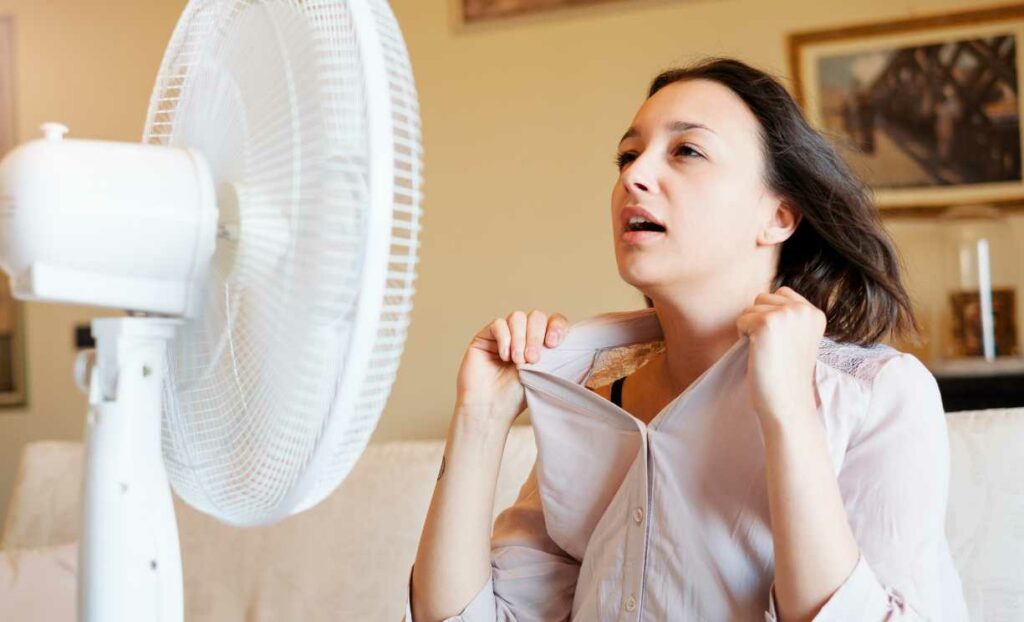Menopause, a natural phase in a woman’s life, brings about hormonal changes that can lead to a range of symptoms, with hot flashes being one of the most common and bothersome. These sudden waves of heat, often accompanied by sweating and discomfort, can significantly impact daily life. In this blog, we’ll explore various treatment options and lifestyle strategies to help women effectively manage and alleviate menopause hot flashes.
Contents
Why Does Menopause Cause Hot Flashes?
Menopause causes hot flashes due to hormonal changes, particularly the decline in estrogen levels. Estrogen plays a crucial role in regulating the body’s internal thermostat, the hypothalamus, which controls temperature. As estrogen decreases during menopause, the hypothalamus becomes more sensitive to small changes in body temperature.
This heightened sensitivity triggers the release of signals to cool down the body, leading to sudden and intense sensations of heat known as hot flashes. The body responds by dilating blood vessels, increasing heart rate, and inducing sweating to release heat. While the exact mechanisms aren’t fully understood, these hormonal fluctuations and their impact on the hypothalamus contribute to the occurrence of hot flashes during menopause.
How Long Can Menopause Hot Flashes Last?
The duration of menopause hot flashes varies from woman to woman. On average, these sudden waves of heat can last for about 7 to 10 years, but this is a general estimate, and individual experiences may differ. Hot flashes tend to be most intense during the early stages of menopause and gradually decrease over time. Some women may experience hot flashes for a shorter duration, while others may have them for a more extended period.
Factors such as genetics, overall health, and lifestyle can influence the duration and intensity of hot flashes. If you’re experiencing bothersome hot flashes that significantly impact your daily life, it’s advisable to consult with a healthcare professional for personalized guidance and support during this natural life transition.
Treatment For Menopause Hot Flashes
The treatment for menopause hot flashes can vary, and women often explore a combination of approaches to find what works best for them. Here are several common treatments:
- Hormone Replacement Therapy (HRT): HRT involves the use of estrogen or a combination of estrogen and progesterone to alleviate menopausal symptoms, including hot flashes. It is effective, but the decision to undergo HRT should be made in consultation with a healthcare professional, as it has associated risks and benefits.
- Non-Hormonal Medications: Medications like selective serotonin reuptake inhibitors (SSRIs) or gabapentin may be prescribed to manage hot flashes. These medications work on neurotransmitters and can help reduce the frequency and severity of hot flashes.
- Regular Exercise: Engaging in regular physical activity has numerous health benefits, including the potential to regulate hormones and reduce the intensity of hot flashes. Exercise also contributes to overall well-being.
- Mind-Body Techniques: Practices such as yoga, meditation, and deep breathing exercises contribute to stress management. These techniques can potentially decrease the occurrence and severity of hot flashes by promoting relaxation and balance.
- Dietary Changes: Avoiding triggers like spicy foods, caffeine, and alcohol can help manage hot flashes. Additionally, incorporating a balanced, plant-based diet rich in nutrients supports overall health during menopause.
- Acupuncture: Acupuncture involves the insertion of thin needles into specific points on the body to rebalance energy flow. Some women find relief from hot flashes through this traditional Chinese practice.
- Cooling Products: Fans, cooling towels, or gel packs provide immediate relief during hot flashes. These products help cool the body and ease the discomfort associated with sudden temperature spikes.
- Stress Management: Practices such as mindfulness, meditation, and relaxation exercises contribute to stress reduction. Managing stress is essential, as heightened stress levels can exacerbate menopausal symptoms, including hot flashes.
Home Remedies For Hot Flashes
Home remedies can offer natural and accessible ways to manage hot flashes associated with menopause. Here are some effective home remedies:
- Cooling Techniques: Applying a cool compress or ice pack to the neck or wrists can help lower body temperature and provide instant relief during a hot flash. Keeping a portable fan nearby can help create a breeze and cool the air around you, reducing the intensity of hot flashes.
- Stay Hydrated: Drinking cold water throughout the day helps maintain hydration and can provide immediate relief during hot flashes. Carry a water bottle to ensure easy access.
- Layered Clothing: Dressing in layers allows you to adjust your clothing quickly when a hot flash occurs. Choose lightweight, breathable fabrics to help regulate body temperature.
- Herbal Teas: Drinking herbal teas with cooling properties, such as peppermint or chamomile, can have a calming effect and contribute to temperature regulation.
- Flaxseed: Flaxseed contains lignans, which may have estrogen-like effects. Adding ground flaxseed to your diet, such as in yogurt or smoothies, could potentially help manage hot flashes.
- Soy Products: Soy contains compounds called phytoestrogens, which mimic the effects of estrogen. Incorporating soy products like tofu or soy milk into your diet may offer relief from hot flashes.
- Deep Breathing Exercises: Practicing deep, slow breathing exercises can help manage stress and reduce the frequency and intensity of hot flashes.
- Yoga and Meditation: Mind-body techniques like yoga and meditation promote relaxation and may help regulate hormonal fluctuations, contributing to a reduction in hot flashes.
- Limit Triggers: Identify and limit consumption of potential triggers like spicy foods, caffeine, and alcohol, as these can exacerbate hot flashes.
- Adequate Sleep: Establishing a consistent sleep routine and creating a cool sleeping environment can contribute to better sleep quality and reduce the likelihood of night sweats.
Can Menopause Hot Flashes Be Prevented?
Preventing menopause hot flashes entirely may not be possible, as they are a natural part of the menopausal transition. However, adopting a healthy lifestyle can help manage and reduce the frequency of hot flashes. Regular exercise, maintaining a balanced diet, and staying hydrated contribute to overall well-being and may alleviate symptoms. Stress-reduction techniques, such as yoga or deep breathing exercises, can lower stress levels, potentially minimizing the occurrence of hot flashes.
Avoiding known triggers like spicy foods, caffeine, and alcohol can also help. Creating a cool environment, using fans, and dressing in layers may provide relief during episodes. While it’s challenging to prevent hot flashes entirely, these lifestyle adjustments can contribute to a more comfortable menopausal experience. If symptoms persist, consulting with a healthcare professional can offer personalized guidance and additional strategies.
Conclusion
In conclusion, managing menopause hot flashes involves a combination of medical interventions, lifestyle adjustments, and home remedies. The journey through menopause is unique for each woman, and finding the right approach may require some exploration. From hormone replacement therapy to cooling techniques, and dietary changes, the array of treatment options empowers women to navigate this natural transition with comfort and confidence. Home remedies offer accessible and effective ways to cope with sudden waves of heat.
While hot flashes may be an inevitable part of menopause, the key lies in discovering a personalized strategy that aligns with individual health needs and preferences. By combining these various treatments, women can reclaim control over their well-being, fostering resilience and embracing the next chapter of life with grace.
If you are facing menopause related issues, menopause treatment at HerMantra can help. Book your free trial online menopause treatment session now.




